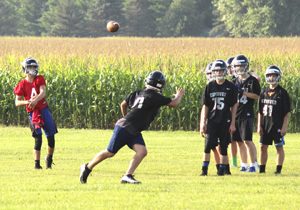Landowners in HLWD and OOWD

The purpose of this letter is to inform owners in the Heron Lake Watershed District of a public hearing on its proposed 2017 budget on August 23rd, at 8:00 pm at the Heron Lake Community Center. It is proposed to again adopt a budget setting the maximum levy of $250,000 with an additional $50,000 levy for data collection. This will be a 20% increase in your tax levy now totaling $300,000. Since this additional levy is allowed once every 5 years by statute, one would wonder why this ($50,000) could not, instead come from the more than adequate reserves being held by the watershed district. These reserves are generating minimal interest income. It was reported, by the HLWD administrator, that the Sate Board of Water and Soil Resources had indicated that the HLWD was inefficient and needed to apply more of its funds to the Best Management Projects. It appears their solution is to raise taxes to address this issue. Note, that again, it is $50,000 for additional administrative costs, which already makes up over 50% of the HLWD’s budget.
It has been reported that the Okabena-Ocheda Watershed District’s board of managers is proposing to do the same. Its tax increase would exceed 59% with a total tax levy of $303,000.
Perhaps a call to your watershed district managers or County Commissioners would be appropriate to find answers.
As a taxpayer who does not live in a Watershed District, I thank those of you who contribute so generously in trying to keep our water clean. Creating another water management agency (Watershed District), has added excessive administration costs for those in the district. Your county elected officials and staff have everything in place to do all that a watershed district does. Watershed districts are an example of pure duplication of government services. Tax payers are already paying their elected officials (Commissioners, Attorneys, Sheriffs, Auditor Treasurers, Recorders, SWCD Supervisors) and the County Extension Services to do this job. They do a great job for those of us not in the Watershed District and without the additional costs associated with the taxes levied by “appointed” watershed district managers. Watershed Districts have even gone to the extent of taking over authority of county ditches with in their boundaries, without County Board approval. This means Jackson, Nobles, Murray, and Cottonwood County Ditch property owners, within the HLWD, lack equitable representation. The majority of members on the HLWD Ditch Authority is made up of managers from counties other than where the ditch is located.
Most county officials are content to leave things as they are, since it doesn’t affect the counties budget and takes work off their plates, not to mention the political relief that it gives! However, one should consider how it does affect budgets of those in a watershed district. Shame on us!
Two-thirds of Jackson County is doing well without the HLWD thanks to our County Soil and Water Conservation District and Extension Service. After nearly 45 years in existence and millions of dollars flushed down Jack and Okabena Creeks by the HLWD, their waters are no cleaner than the rest of the waters in the County. The HLWD’s own statistics show no significant increase in the water quality attributable to their actions. In comparison, look what our SWCD’s have done for their entire county, in the same amount of time, without the authority to levy taxes. I would challenge anyone to tell me what watershed districts do, that can’t be done and should be done by the county, SWCD’s and Extension Services together. To my knowledge, watershed districts were not founders of CRP, CREP, RIM, EQIP, Cover Crops, Controlled Drainage, water retention ponds, J-Hook Weirs, Cedar Abutments, grass waterways, nutrient management, rock inlets or their rain gardens. In my opinion, some watershed districts are simply very expensive fiscal hosts, who spend a great deal of time and money, showcasing the work of others, and then taking credit for it!
Since their existence is largely dependent on obtaining grants, which are decreasing, my solution would be for the counties or SWCD’s to simply hire a grant writer, or shared grant writer, replacing the watershed district entirely, and have the SWCD’s implement the projects. This would, however require the people in the watershed district to file a petition to dissolve its watershed district, thereby forcing county officials to do the job they are elected and paid to do, and in many cases are already doing. Here exists a way for taxpayers, upset about the government duplication and excess taxes, to help eliminate watershed districts upon receipt of such petition. Watershed districts were formed by a petition and can only be dissolved by a petition of the people.
People united “CAN” change things. Help yourself or just continue to pay the taxes.
Dave Henkels










